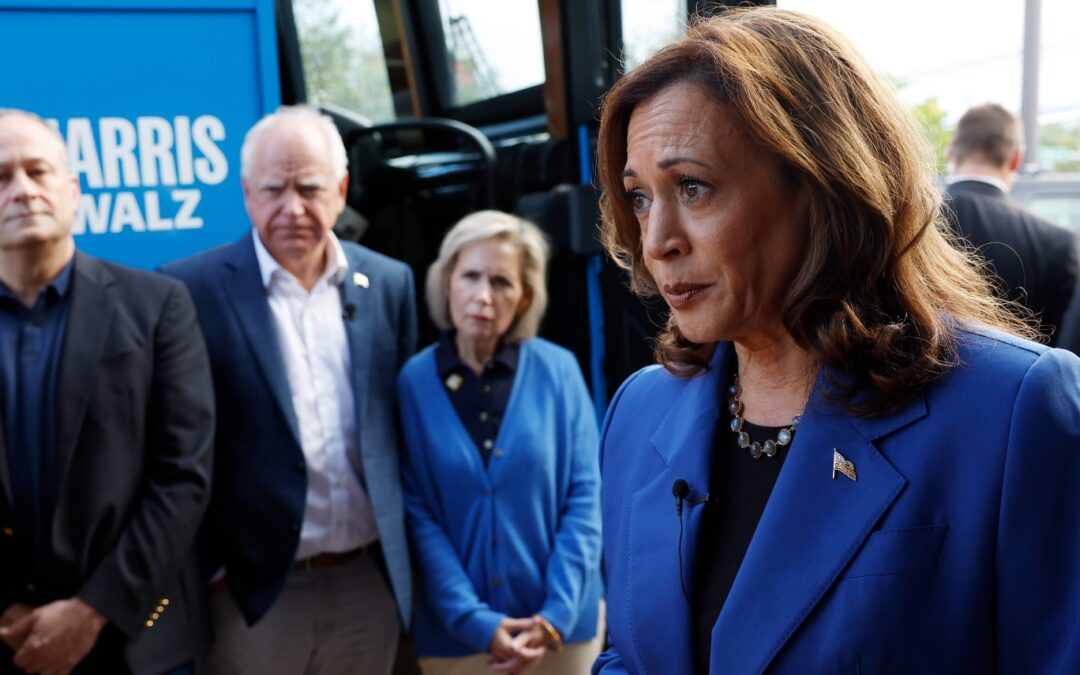Vice President Kamala Harris took questions from reporters just before the Democratic National Convention starts in Chicago on Monday and it did not go well for her.
One reporter asked Harris about her economic plan, which has been compared to the ways that Venezuela and the Soviet Union ran their economies.
Harris has come up with a plan to set prices that would let the Federal Trade Commission (FTC) and state attorneys general fine grocery stores and their sellers very heavily if their prices are thought to be too high. She also wants to give $25,000 to “first-generation home buyers” and “forgive” medical debt, mostly for people who vote Democratic Party.
“You unveiled your economic policies last week. Can you explain how you’re going to pay for those, and can you give me an example of what other policies you want to unveil next?” the reporter asked.
Harris replied with a typical “word salad,” where she failed to outline how her policies would be implemented if she wins the November election.
“Well, I mean, you just look at it in terms of what we are talking about, for example, around children, and the child tax credit, and extending the EITC. That is at $6,000 for the first year of a child’s life. The return on that investment, in terms of what that will do and what it will pay for will be tremendous,” the vice president said.
She then claimed that the Biden-Harris administration has “reduced child poverty by 50 percent,” again failing to provide any specifics on the implementation of her plan.
“And then what we’re doing in terms of the tax credits, we know that there’s a great return on investment. And when we increase homeownership in America, what that means in terms of increasing the tax base, not to mention property tax base, what that does to fund schools, again, return on investment,” Harris continued as her running mate, Minnesota Governor Tim Walz, looked on.
“I think it’s a mistake for any person who talks about public policy to not critically evaluate how you measure the return on investment. When you are strengthening neighborhoods, strengthening communities, and in particular the economy of those communities, and investing in a broad-based economy, everybody benefits, and it pays for itself.”
People on both sides of the political spectrum, including some well-known economists on the left, have slammed Harris’ “radical” and “socialist” economic plan.
A Harvard economist named Jason Forman, who was a top economic assistant in the Obama administration, said Harris’s ideas are “not sensible.”
“This is not sensible policy, and I think the biggest hope is that it ends up being a lot of rhetoric and no reality,” Forman said in a recent interview with the New York Times. “There’s no upside here, and there is some downside.”
Former President Donald Trump has compared Harris’ proposals to those of Venezuelan dictator Nicolas Maduro.
“Now, Kamala is reportedly proposing communist price controls. She wants price controls. And if they worked, I’d go along with it too. But they don’t work. They actually have the exact opposite impact and effect. But it leads to food shortages, rationing, hunger, dramatically more inflation. Their Inflation Reduction Act, by the way, was a disaster. It’s what caused the inflation. Their Inflation Reduction Act was a con job,” the former president said during a press conference earlier this week.
“I said, that’s going to cause tremendous inflation, and it did, among other things, like energy. She’s running on the Maduro plan. We call it the Maduro plan, like something straight out of Venezuela or the Soviet Union.”









